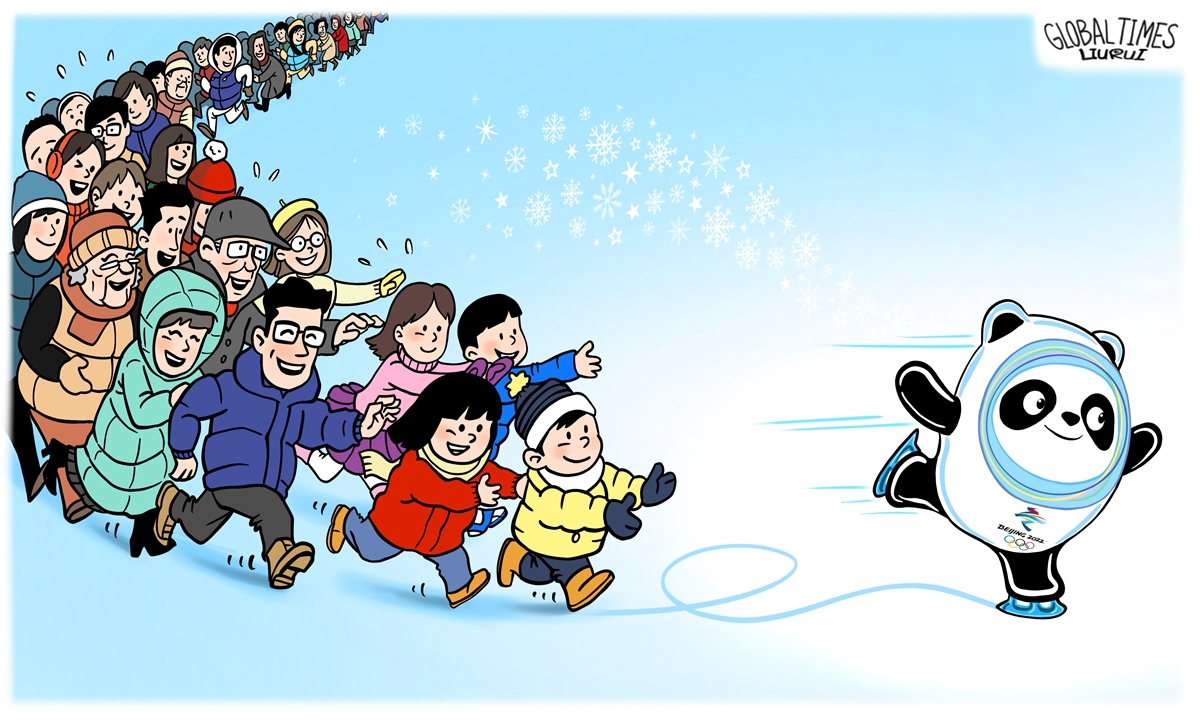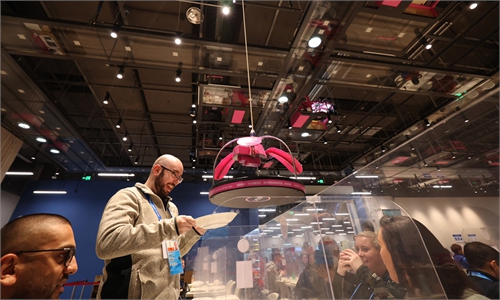
Illustration: Liu Rui/GT
If you have been following the Winter Olympics in Beijing, then you have probably heard of the loveable official mascot Bing Dwen Dwen. The mascot, who is a rotund Panda wearing a suit of ice, has become a sensation in China, with dolls of it selling out rapidly in a craze and long overnight queues. Sounds innocent enough right? The Western media doesn't think so. A number of outlets have responded to Bing Dwen Dwen's popularity with claims that it is effectively part of a state-led propaganda campaign to sell the narrative of the Winter Olympic Games.
In an article published in the Sydney Morning Herald, a title leads with "'Viral' Bing Dwen Dwen helps China write the script of the Games." The article proceeds to claim that thousands of state-created accounts are pushing the mascot to write the narrative of the games online, subsequently quoting a researcher from the hawkish, controversial US- and defense industry-funded Australian Strategic Policy Institute (ASPI) to criticize the Chinese "propaganda and information operations."
This claim of course on the surface is laughable, yet it is a connotation of the world we live in, demonstrating how the Western media descend to extreme levels of hysteria, mass paranoia, fear invocation and deliberate instigation of distrust in the waging of a broader public opinion war against China. In doing so, everything affiliated with the country is dehumanized, linked to the Party in a grand plot, and accused of having some kind of nefarious purpose or intention, even to the point of attacking a cute mascot. Bing Dwen Dwen may be a symbol of China, but it is also a symbol of how the West is acting out of vitriol.
Since the Winter Olympics began, there has been an orchestrated campaign throughout the mainstream media to focus exclusively on negative publicity. There is a fear in some Western countries led by the US that China may use the event to acquire legitimacy for itself and political ends. This sentiment is what led to the decision to pursue diplomatic boycotts, and in turn, the all-embracing media hate campaign which has played up every possible disagreement, dispute or critical angle. Whilst downplaying the opening ceremony, the media coverage focused exclusively upon Uygurs and Xinjiang, framing athletes' experiences as negative, and labeling China's zero-COVID policies as oppressive and netizens as unforgiving.
It is no surprise that amongst this tirade, even Bing Dwen Dwen is not spared. The popularity of the stuffed bear is of course little more than a marketing and merchandizing campaign in practice. In East Asian countries, "trends" are a common part of life, creating consumer blitzes and crazes for certain products. Few would ever accuse the same social behavior visible in South Korea or Japan as being a subtle propaganda campaign, would they? This only serves to show how in the views of the Western media, Chinese people are deprived of their agency. In every domain, whether it be studying or their own political opinions, if they do not follow the conventional Western liberal narrative, they are accused of being brainwashed or acting in bad faith on behalf of the interests of the Party.
In no instance then, is it assumed that Chinese people are actually interested in Bing Dwen Dwen, but that the urge to write about it online and post content must have a political agenda behind it and must be inauthentic as part of this broader grand plot to politicize the Olympics. Ironically, it is the other side who from start to finish, has politicized and sought to derail the event. There is only one party here acting in bad faith, one party who seeks to influence public opinion and one party manipulating the public in turn: That is Western governments and their affiliated media.
Whilst the people of China have got into the spirit of the Winter Olympics and the Olympics have influenced consumer trends, the Western mindset influenced by the press is a fixated hatred, paranoia and resentment. This demonstrates two worlds, one of hatred espoused in the West, and one of hope and embracement in China. One hopes that the Western public will ultimately wake up to this level of poisonous manipulation, and recognize that the campaign to demonize and arouse suspicion over a stuffed bear mascot is a demonstration of just how unhinged and unreasonable this all is.
The author is a political and historical relations analyst. opinion@globaltimes.com.cn

